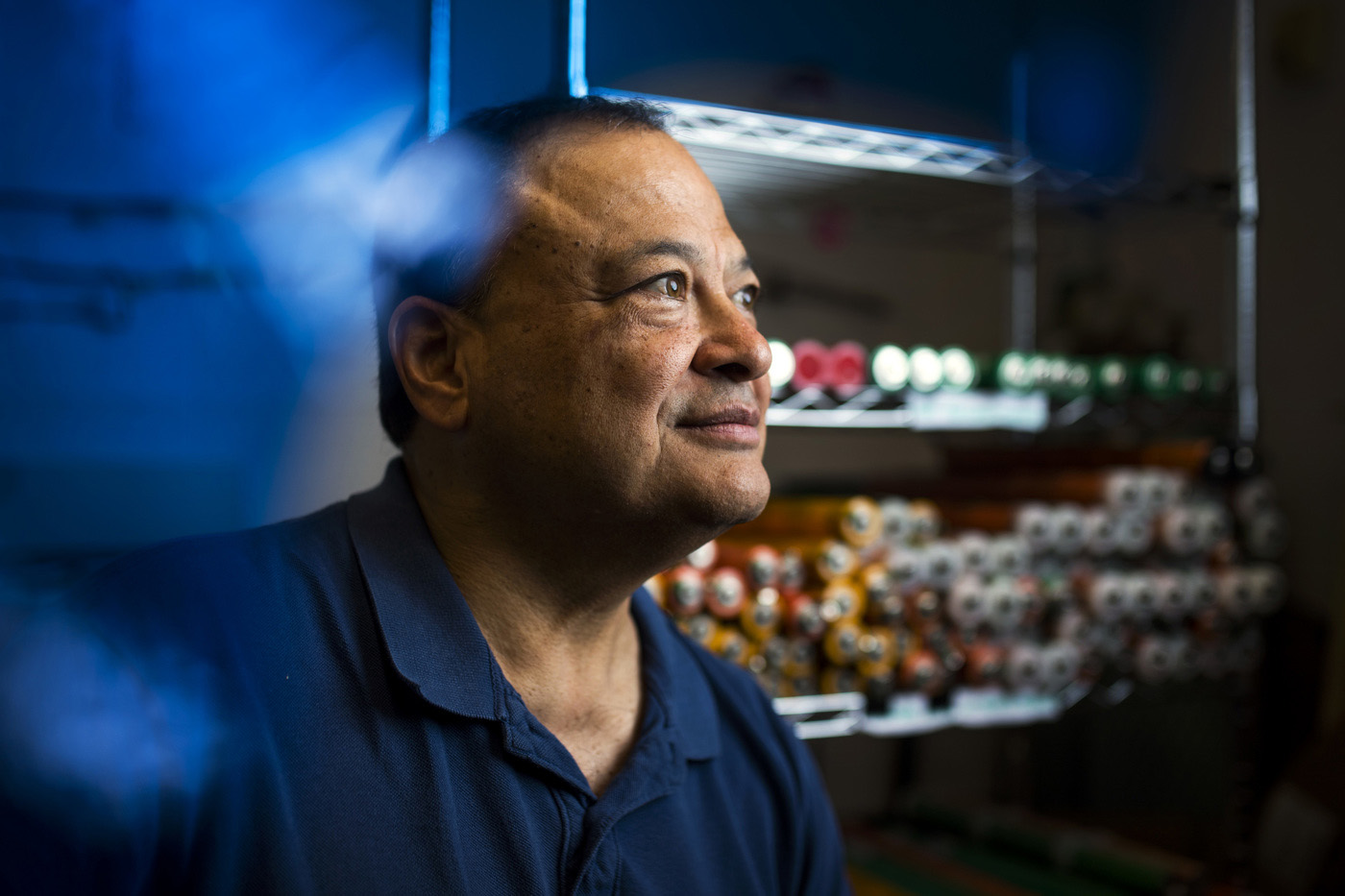Adapting to a future fueled by renewable energy will take a global effort by the science community. Professor Eugene Smotkin is taking “renewable” to a new level.

Professor Eugene Smotkin with Roberto, a Puerto Rican subsistence farmer that is targeted for assistance through Smotkin’s Technology and Education Center for Renewable Energy nonprofit in Puerto Rico. Photo Credits: Evelia Contreras |
Within the solar panels and electric cars that make up renewable energy initiatives, there are many complex chemical reactions that allow for clean energy. “My group studies materials and the analytical chemistry of materials that are relevant to renewable energy,” said Smotkin.
With hybrid cars becoming more commonplace on the roads, Smotkin and his research group have investigated the reusable potential of hybrid batteries. Many hybrid vehicles, such as the Toyota Prius, use nickel-metal hydride rechargeable batteries over a traditional lithium-ion battery. As Smotkin has found, these batteries have reversible failure modes—the batteries lose capacity over time, but they can be reconditioned and reused.
“If you can prevent the consumer from buying a brand-new battery for a vehicle that is only fifteen years old, that’s an amazing thing,” Smotkin said.
In an interest of sharing his research, Smotkin was interviewed for a podcast episode on National Oil and Lube News, whose audience is primarily in the automotive maintenance business. In the interview, Smotkin emphasizes the power of an electric vehicle aftermarket, where battery capacity can be renewed for other hybrid vehicles or reincorporated into other clean energy systems. This core concept of Smotkin’s research inspired a successful electrochemical company and an impactful nonprofit.
In 1999, after Smotkin was recruited to Northeastern from Puerto Rico as an assistant professor, Smotkin published a paper on electrochemistry that would inspire him and a few friends to form NuVant Systems Inc. Initially, as with many start-ups, it did not look good for Smotkin and co.
“You can’t make a business out of a publication, but we were naïve, and we thought we could do that,” Smotkin said. “And of course, we spent down the money to almost nothing. It was scary because you have investors, and if we decided to just close the company up then everybody would lose their investment.”
But there was an issue with closing the company—Smotkin employed many international Northeastern graduate students, and if the company closed, those employees would lose their work visas and be deported. Instead, Smotkin and his co-founder took their own money, bought the company from the investors, and planned “to just keep the company long enough for all of them to get their green cards and then the plan was to close it down.”
The plan never came to fruition—NuVant is now a worldwide provider of renewable battery technology. But Smotkin’s endeavors in renewable energy do not end there. In his home of Puerto Rico, he recognized a deficit in renewable energy education.
“There are a lot of people that don’t have the opportunity to go to a college or university in Puerto Rico. Those that do go to the good universities, many of them leave the island,” Smotkin said. “There is a diaspora that’s been going on for a long time.”
Smotkin aims to ail this with the formation of his nonprofit, Technology and Education Center for Renewable Energy, or TECRE. “We would like TECRE to eventually become a vocational school that teaches students these processes,” Smotkin detailed, emphasizing the value of teaching Puerto Rican communities the paths to adopting and maintaining renewable energy systems.
Smotkin’s ENSY 5300 graduate course investigates how battery reconditioning may provide low-cost energy storage in Toro Negro, a “utopian” community in Puerto Rico made up of a few families that are self-sufficient and relatively off-the-grid. His students are understanding how making renewable energy switches could be valuable to this community but require educating the families on how to maintain and enhance the resources they have.
“What the University has done, which is amazing, is that they have allowed me to exist,” Smotkin commented on his work and his relationship with Northeastern’s College of Science.
Professor Eugene Smotkin’s research is changing the game when it comes to revamping batteries and he has been happy to work with Northeastern University and its College of Science students on his many projects.

